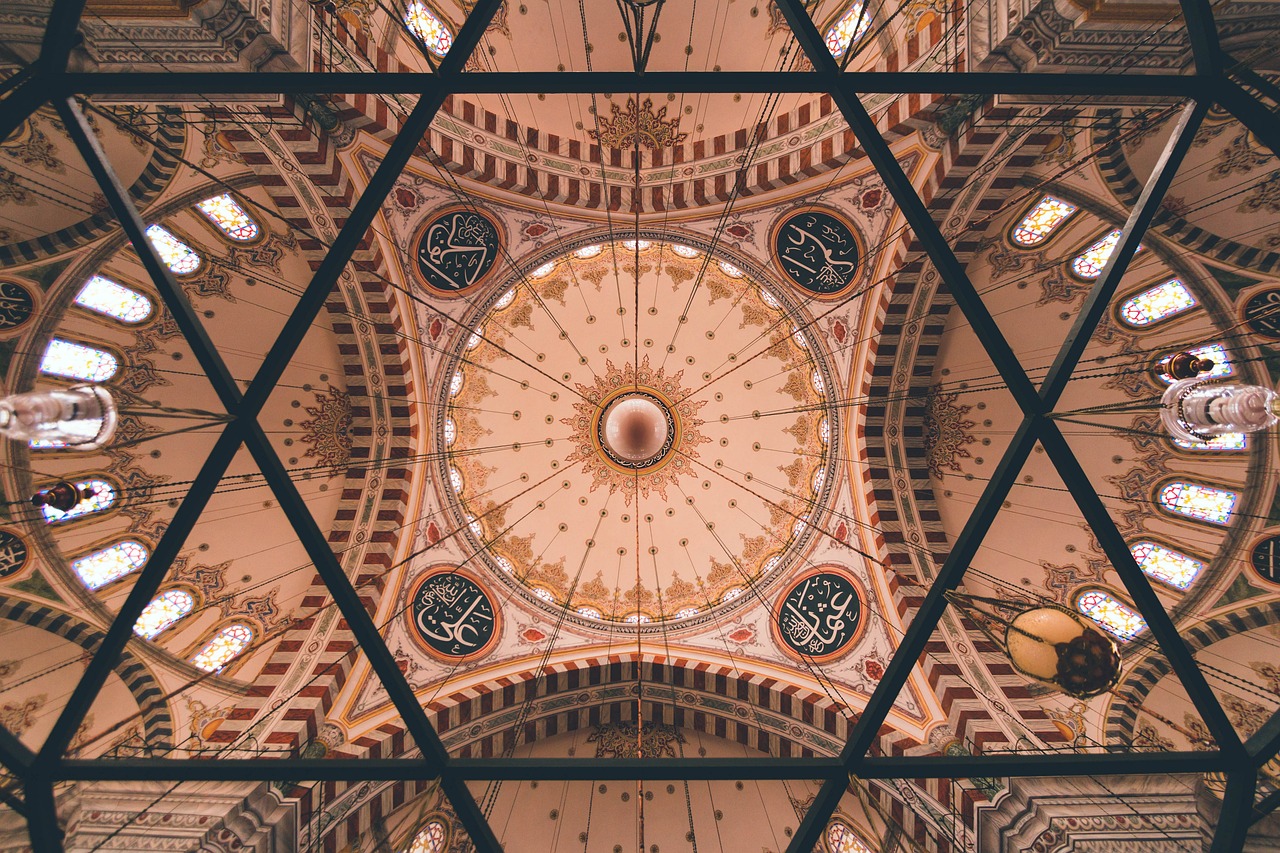
In the Name of Allah—the Most Compassionate, Most Merciful.
At the heart of a Muslim’s spiritual journey, the masjid (mosque) serves not only as a place of worship but as a sanctuary for reflection, peace, and community.
The act of entering and leaving the masjid, accompanied by specific prayers or duas, embodies a profound connection with Allah (God) and an adherence to the Sunnah (the way of the Prophet Muhammad, PBUH).
These prayers encapsulate intentions of mercy, protection, and gratitude and are a significant aspect of Islamic tradition.
Du’a for Entering the Masjid
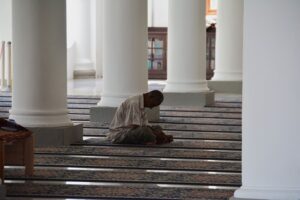
Upon entering the masjid, it is Sunnah to recite a specific dua, earnestly seeking Allah’s abundant mercy and profound blessings.
This practice is deeply rooted in the teachings of the Prophet Muhammad (PBUH), who emphasised the importance of remembering Allah in all actions.
The dua for entering the masjid reflects a Muslim’s sincere intent to enter a state of worship and devotion.
Arabic
English Transliteration
“Bismillah, was-salatu was-salamu ‘ala rasoolillah, allahumma aftah li abwaba rahmatik.”
English Translation
Dua for Entering Masjid Al Haram
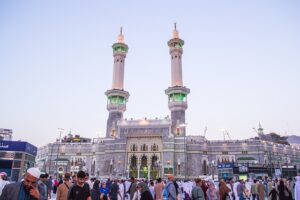
The Masjid al-Haram in Mecca holds a special place in Islam, being the holiest site. The dua recited upon entering Masjid al-Haram carries the same words but is imbued with a profound sense of awe and reverence for the sanctity of the location.
Pilgrims and visitors are encouraged to reflect on the magnificence of this holy site and the privilege of being able to pray in such a sacred space.
Arabic
“Allahumma iftah li abwaba rahmatik.”
English Translation
Dua for Going to the Masjid

Before setting out for the masjid, there is a profoundly beautiful supplication that just perfectly encapsulates the believer’s sincere intention and deep hopes for their visit to this place itself.
This dua, recited with the heartfelt aim of seeking Allah’s guidance, protection, and abundant blessings on the journey to the mosque, is a crucial part of preparing oneself spiritually for prayer and worship.
Arabic
English Transliteration
“Allahumma ij’al fee qalbi nooran, wa fee lisani nooran, wa ij’al fee sam’i nooran, wa ij’al fee basari nooran, wa ij’al min khalfi nooran, wa min amami nooran, wa ij’al min fawqi nooran, wa min tahti nooran. Allahumma a’tinee nooran.”
English Translation
Dua When Leaving the Masjid
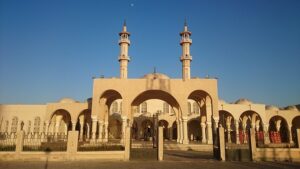
Exiting the masjid is marked by another dua, expressing gratitude to Allah for the opportunity to have spent time in His house and seeking His grace as the believer returns to worldly life.
Arabic
English Transliteration
“Bismillah, was-salatu was-salamu ‘ala rasulillah. Allahumma inni as’aluka min fadlik, Allahumma ‘asimni minash-Shaytanir-rajim.”
English Translation
Sunnah and Etiquette for Entering and Leaving Masjid
The practices surrounding entering and leaving a masjid are deeply embedded in Islamic tradition, demonstrating respect, reverence, and a mindful approach to worship. These are not only about physical actions but also about cultivating a spiritual state that reflects the sanctity of the mosque.
- Enter the masjid with the right foot to symbolise purity and peace.
- Recite the masjid dua upon entering to connect with Allah immediately.
- Dress in clean, modest attire in accordance with Islamic principles.
- Maintain silence and peace within the masjid as a space of worship and reflection.
- Perform a two-rakah prayer (Tahiyatul Masjid) upon entering as a sign of respect.
- Leave the masjid with the left foot, symbolising the resumption of worldly duties.
- Recite the dua for leaving to seek Allah’s continuous mercy and guidance
Reward and Benefits of Praying in the Mosque
Praying in the mosque holds special significance and numerous benefits, including:
Greater Blessings for Group Prayers
Islam holds group prayers at the mosque in high esteem, promising much more reward than solitary prayers at home. Teachings from the Hadith reveal that joining others at the mosque can amplify the rewards by up to 27 times.
This underscores the importance of collective worship and the shared experience of faith, emphasising how Allah’s peace envelops those who pray together in His name.
Building a Strong Community
The mosque stands as a central hub, a place where all differences fade away, and individuals unite in prayer, side by side. This communal prayer strengthens the bonds of brotherhood and unity, offering a support system that goes beyond the mosque’s walls.
It’s here, in this shared space, where the light of camaraderie shines brightest, guided by the desire to seek Allah’s guidance and mercy together.
A Haven for Spiritual Growth
With its serene atmosphere, the mosque offers a unique setting for worship. The calmness within these sacred walls allows worshippers to concentrate deeply, fostering a connection with Allah that’s both intimate and profound.
This environment is perfect for achieving heightened states of spiritual insight, meditation, and personal growth, all under the illumination of divine light (noor).
A Centre for Learning and Enlightenment
Mosques serve not just as places for prayer but as vital centres for learning and spiritual education. Through sermons, studies of the Quran, and discussions on the Hadith, mosques provide invaluable resources for deepening one’s understanding of what Islam really is.
This role is essential for spreading Islamic teachings and nurturing a community that’s well-informed about its faith.
So, in every prayer whispered, every Quranic verse read, and every lesson absorbed within the mosque’s holy embrace, Muslims find a direct path to seeking Allah’s protection, forgiveness, and infinite wisdom.
It’s in these moments of collective worship and individual reflection that the mosque reveals its true essence as a location of divine light, a beacon for those navigating the path of faith.
Hadiths for Entering and Leaving the Masjid
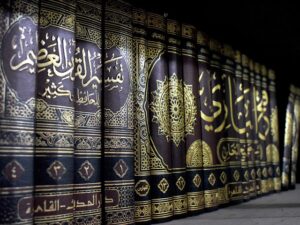
To directly address the request for hadiths pertaining to the practices of entering and leaving the mosque, here are two authentic narrations that highlight these significant acts of worship:
Hadith on Entering Mosque
Anas ibn Malik reported that the Prophet Muhammad (PBUH) said:
Reference: Sahih Al-Bukhari and Sahih Muslim
This hadith underscores the practice of Tahiyatul Masjid, a voluntary prayer that Muslims are encouraged to perform upon entering the mosque (as time permits). It signifies respect for the mosque as a place of worship and acknowledges Allah’s presence. This prayer prepares the individual for a period of reflection and worship, setting a spiritual tone for the entire stay.
Hadith on Leaving the Mosque
While there are duas recommended for leaving the mosque, hadiths directly addressing the act of leaving with a specific prayer are not as commonly cited. However, the emphasis on continuous remembrance of Allah (Dhikr) applies.
One related teaching from the Prophet Muhammad (PBUH) that can be reflected upon when leaving the mosque is about the importance of Dhikr:
Abu Huraira reported that the Messenger of Allah (PBUH) said:
Reference: Sahih Bukhari
Though this hadith speaks more to the state of being engaged in prayer and remembrance while at the mosque, it encourages Muslims to maintain a state of purity and remembrance of Allah at all times, even as they leave the mosque, embodying the continuous nature of worship in Islam.
Dua for Entering Home

Dua, for entering one’s home, seeks to bring peace and blessings into the household.
Arabic
Transliteration
“Allahumma inni as’aluka khayr al-mawliji wa khayr al-makhraji. Bismillah walajna, wa ‘ala Allah rabbana tawakkalna.”
Translation
Summary – Dua for Entering and Leaving Masjid
Reciting specific phrases upon entering and exiting spiritual centres is a tradition deeply rooted in the teachings of the Prophet Muhammad (PBUH). These phrases turn routine moments into profound acts of faith.
This practice embeds spirituality into daily life, reinforcing a believer’s connection to the Divine. It highlights the importance of maintaining a spiritual mindset, infusing every action with devotion, and continuously reminding oneself of their faith and values in all aspects of life.



